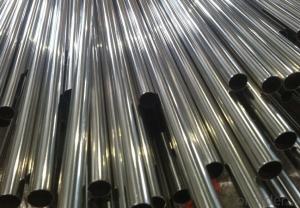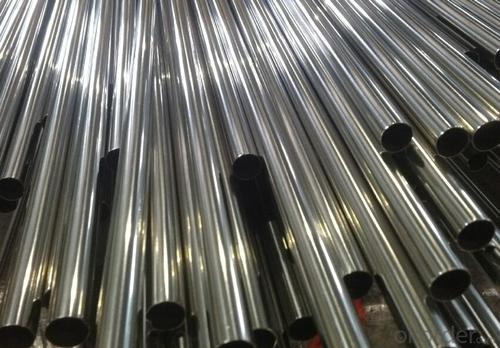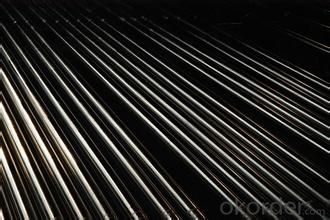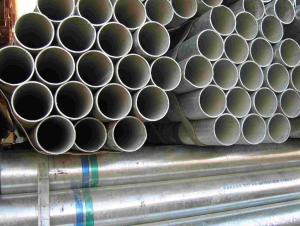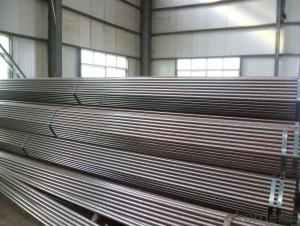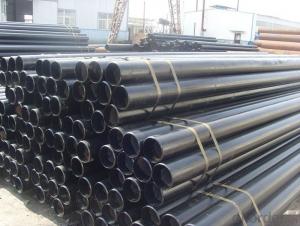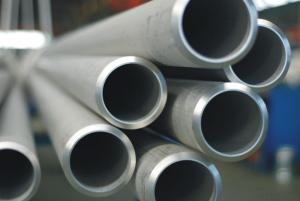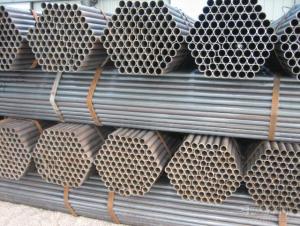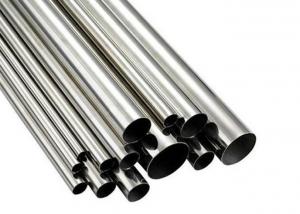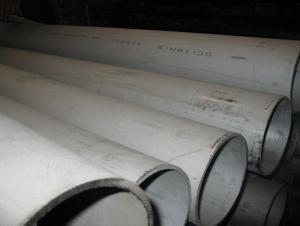Stainless Seamless Round Hot Sale Steel Tubes
- Loading Port:
- China main port
- Payment Terms:
- TT or LC
- Min Order Qty:
- 100 kg
- Supply Capability:
- 10000 kg/month
OKorder Service Pledge
OKorder Financial Service
You Might Also Like
1、Structure of Seamless Pipe :
Seamless pipe is formed by drawing a solid billet over a piercing rod to create the hollow shell.They are regarded as withstanding pressure better than other types, and are more easily available than welded pipe.
2、Main Features of the Seamless Pipe :
• Strong heat dissipation ability
• Good visual effect
• Reasonable price
• High manufacturing accuracy
• High strength
• Small inertia resistance
3、Seamless Pipe Specification:
Standard | GB, DIN, ASTM ASTM A106-2006, ASTM A53-2007 |
Grade | 10#-45#, 16Mn 10#, 20#, 45#, 16Mn |
Thickness | 8 - 33 mm |
Section Shape | Round |
Outer Diameter | 133 - 219 mm |
Place of Origin | Shandong, China (Mainland) |
Secondary Or Not | Non-secondary |
Application | Hydraulic Pipe |
Technique | Cold Drawn |
Certification | API |
Surface Treatment | factory state or painted black |
Special Pipe | API Pipe |
Alloy Or Not | Non-alloy |
Length | 5-12M |
Outer Diameter | 21.3-610mm |
Grade | 20#, 45#, Q345, API J55, API K55, API L80, API N80, API P110, A53B |
Standard | ASME, ASTM |
1) Material:20#(ASTM A 106/A53 GRB.API5LGRB,GB),45#,16Mn,10#.
2) Specification range:OD:21.3-610mm,WT:6-70mm,length:6-12m or according to the requirement of clients.
3) Excutive standards:GB,ASME API5L.ASTM A 106/A53,Despite of the above standards,we can also supply seamless steel pipe with standard of DIN,JIS,and so on,and also develop new products according to the requirements of our clients!
4) Surface:black lacquered,varnish coating or galvanized.
4、Packaging & Delivery
Packaging Details: | seaworthy package,bundles wrapped with strong steel strip |
Delivery Detail: | 15-30days after received 30%TT |
5、FAQ of Seamless Pipe :
①How is the quality of your products?
Our products are manufactured strictly according to national and internaional standard, and we take a test on every pipe before delivered out. Guaranteed: If products’ quality don’t accord to discription as we give or the promise before you place order, we promise 100% refund.
②How about price?
Yes, we are factory and be able to give you lowest price below market one, and we have a policy that “ for saving time and absolutely honest business attitude, we quote as lowest as possible for any customer, and discount can be given according to quantity”,if you like bargain and factory price is not low enough as you think, just don’t waste your time.
6、Seamless Pipe ASTM A106/53 Images:
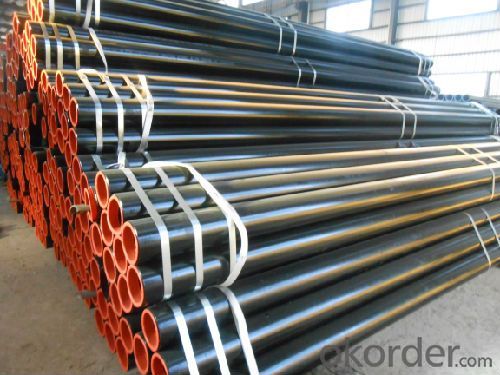
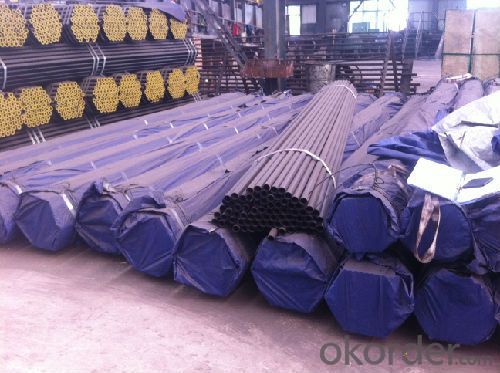
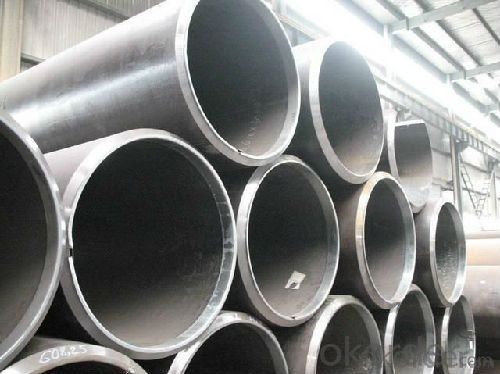
- Q: What is the difference between steel pipes and PVC-U pipes?
- Steel pipes are made of a durable and strong material, while PVC-U pipes are made of a plastic material. Steel pipes are typically used for high-pressure and heavy-duty applications, as they can withstand harsh conditions and have a longer lifespan. PVC-U pipes, on the other hand, are lighter in weight, easier to handle, and resistant to corrosion and chemicals. They are commonly used for low-pressure applications and are more cost-effective.
- Q: Can steel pipes be used for water distribution networks?
- Yes, steel pipes can be used for water distribution networks. Steel pipes are commonly used for water distribution due to their durability, strength, and resistance to corrosion. They can efficiently handle high water pressure and are suitable for both underground and above-ground installations. However, proper protective coatings are necessary to prevent rusting and maintain water quality.
- Q: Are steel pipes suitable for wastewater treatment plants?
- Yes, steel pipes are suitable for wastewater treatment plants. Steel pipes are known for their durability, corrosion resistance, and high strength, making them ideal for handling the demanding conditions of wastewater treatment plants. They can effectively transport and contain wastewater without any structural or functional issues, ensuring efficient and reliable operation of the treatment process.
- Q: How are steel pipes used in the manufacturing of furniture and appliances?
- Steel pipes are commonly used in the manufacturing of furniture and appliances due to their strength, durability, and versatility. One of the main uses of steel pipes in furniture manufacturing is for constructing the frames or structures of various pieces, such as chairs, tables, and beds. These pipes are often used as the primary support system, providing a sturdy and reliable foundation for the furniture. In appliances, steel pipes are utilized for various purposes. They are commonly employed in the manufacturing of kitchen appliances, such as stoves, ovens, and refrigerators, to create the internal framework and support the weight of the appliance. Steel pipes are also frequently used in the production of washing machines, dryers, and dishwashers to transport water and other fluids throughout the appliance. Furthermore, steel pipes are utilized in the manufacturing of outdoor furniture and equipment, where weather resistance and durability are crucial. These pipes are often coated with protective materials to prevent rust and corrosion, ensuring the longevity of the furniture and appliances. Overall, steel pipes play a vital role in the manufacturing of furniture and appliances, providing the necessary strength and support required for these items. Their versatility allows for various applications, making them an essential component in the production process of these goods.
- Q: What is the role of steel pipes in sewage systems?
- The role of steel pipes in sewage systems is to provide a durable and reliable means of transporting wastewater and sewage from homes, businesses, and other sources to treatment plants or disposal sites. Steel pipes are known for their strength, corrosion resistance, and longevity, making them suitable for withstanding the harsh and corrosive nature of sewage. They are capable of handling high-pressure flows and can withstand the weight and pressure of the surrounding soil. Additionally, steel pipes are often used in larger diameter applications due to their ability to carry larger volumes of sewage efficiently.
- Q: What are the thermal properties of steel pipes?
- Steel pipes have excellent thermal conductivity, meaning they can efficiently transfer heat. They also have a high melting point and can withstand high temperatures without deformation. Additionally, steel pipes have low thermal expansion, allowing them to maintain their shape and structural integrity even when exposed to extreme temperature changes.
- Q: What's the difference between hot-rolled seamless steel tube and cold-rolled seamless steel tube?
- The difference between hot rolled seamless steel tube and cold rolled seamless steel tube:1) cold-rolled seamless tubes tend to be of small diameter, and hot-rolled seamless tubes are often of large diameter.2) the accuracy of cold-rolled seamless steel tube is higher than that of hot-rolled seamless steel tube, and the price is higher than that of hot-rolled seamless steel tube.
- Q: What are the future trends in steel pipe manufacturing?
- Some of the future trends in steel pipe manufacturing include the use of advanced automation and robotics, the development of high-strength and lightweight steel materials, the implementation of sustainable and environmentally friendly manufacturing processes, and the integration of digital technologies for improved quality control and efficiency. Additionally, there is a growing focus on developing steel pipes with enhanced corrosion resistance and durability to meet the demands of various industries such as oil and gas, construction, and automotive.
- Q: Can steel pipes be used for conveying hydraulic fluids?
- Yes, steel pipes can be used for conveying hydraulic fluids. Steel pipes are commonly used in hydraulic systems due to their high strength, durability, and resistance to high-pressure environments. They can effectively transport hydraulic fluids without leakage or significant loss in pressure.
- Q: How are steel pipes insulated to prevent heat loss?
- Steel pipes are typically insulated to prevent heat loss by wrapping them with insulation materials such as mineral wool, fiberglass, or foam. These insulation materials provide a barrier that traps heat within the pipes, preventing it from being lost to the surrounding environment. Additionally, pipes may also be covered with an outer protective layer, such as aluminum or PVC, to further enhance insulation and protect against external elements.
Send your message to us
Stainless Seamless Round Hot Sale Steel Tubes
- Loading Port:
- China main port
- Payment Terms:
- TT or LC
- Min Order Qty:
- 100 kg
- Supply Capability:
- 10000 kg/month
OKorder Service Pledge
OKorder Financial Service
Similar products
Hot products
Hot Searches
Related keywords
